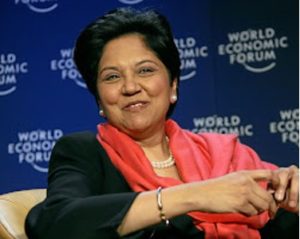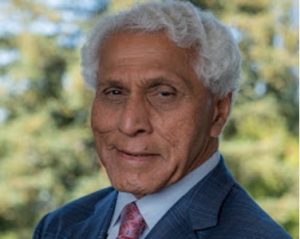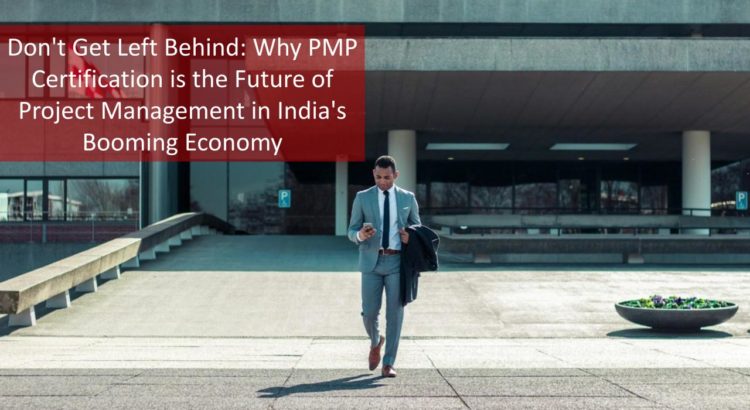India’s economy is on a trajectory of robust growth, fueled by sweeping reforms, strategic investments in infrastructure, and a burgeoning digital economy. This expansion presents a fertile landscape for professionals equipped with Project Management Professional (PMP) certification and robust project management experience.
This blog highlights India’s potent opportunity for growth and delves into the essence of PMP certification in India, its alignment with the agile framework, and how it positions project management careers for not only opportunities in India but also in the US, Europe, and the Middle East. We also review pivotal Indian Americans who have or currently lead publicly traded companies in the United States and have illustrated project management excellence.
You can start your journey today by enrolling in Master of Project Academy’s PMP courses:
Our top-tier courses now feature subtitles in a vibrant bouquet of languages: Spanish, French, German, Portuguese, Hindi, Bengali, and Arabic. This means you can conquer the project management world in your native tongue, or brush up on your PM skills while picking up a new language – the choice is yours! Unleash your potential and let the learning spree begin, because no matter where you’re from or what language you speak, we believe in empowering every mind to soar to new heights!
Here’s how the intertwining of India’s economic growth and its infrastructural investments opens up a myriad of opportunities for these professionals:
Economic Growth Drivers in India
India’s economy is growing due to several key factors:
- Growth Trajectory: India is projected to be the world’s fastest-growing major economy in 2023 and beyond, with a GDP growth of 7% or more. This translates to a booming market brimming with potential for diverse industries. In addition, India is becoming a sought out global travel destination among discerning travelers.
- Demographic Dividend: India has one of the world’s youngest populations, which is a significant driver of consumption and productivity.
- Digital Revolution: India is experiencing a digital transformation, driven by initiatives like Digital India and Make in India. This creates a demand for tech-savvy project managers who can navigate the complexities of digital infrastructure development.
- Government Initiatives: Programs like ‘Smart Cities Mission’ are aimed at boosting manufacturing, enhancing digital infrastructure, and modernizing urban centers, respectively.
- Foreign Direct Investment (FDI): Liberalized FDI policies have attracted substantial investments in various sectors, including technology, retail, and manufacturing.
- Urbanization Wave: India’s urban population is rapidly expanding, necessitating investments in smart cities, sustainable transportation, and efficient energy grids. Project managers are crucial to the successful execution of these ambitious infrastructure projects.

Investing in the Future: Infrastructure as a Catalyst:
- Massive Investments: The Indian government has outlined a $1.5 trillion USD infrastructure investment plan over the next five years. This includes initiatives in sectors like transportation, energy, water, and digital infrastructure. All of these sectors require extensive project management skills making now the perfect time to have a pmp certification in India.
- Focus on Sustainability: The emphasis on sustainable development creates opportunities for project managers with expertise in green technologies and renewable energy.
- Public-Private Partnerships: The government is increasingly collaborating with private players for infrastructure development, creating a collaborative environment for skilled project managers.
Infrastructure Development: A Catalyst for Opportunity
The Indian government’s focus on infrastructure development is a critical element in the country’s growth narrative. Significant investments are being channeled into constructing highways, railways, airports, smart cities, and digital networks to support the burgeoning needs of its population and economy. These projects not only enhance the country’s physical and digital infrastructure but also stimulate economic growth by creating jobs, improving productivity, and attracting more investment.
This creates a significant demand for proficient project managers who can navigate the complexities of today’s agile and dynamic projects has never been higher. Amidst this backdrop, the Project Management Professional (PMP) certification emerges as a beacon of excellence, offering a comprehensive framework that has proven to be more universally recognized than its counterparts like PRINCE2.
Foreign Investment: Accelerating Opportunities
The landscape of foreign investment in India has been notably transformed by the active participation of multinational giants such as Amazon, Facebook (now Meta), Apple, Taiwan Semiconductor Manufacturing Company (TSMC), Nvidia, and others. Their investments are a testament to India’s burgeoning market potential, strategic positioning, and robust talent pool and the more reason to have a PMP Certification in India. Here’s a snapshot of how these corporations are investing in India and the impact of their investments:
Amazon
Amazon has been aggressively expanding its presence in India, seeing the country as a critical market for its global growth strategy. The e-commerce giant has committed billions of dollars to its Indian operations, aiming to tap into the vast consumer base, enhance its supply chain infrastructure, and develop technological hubs. This investment aims to tap into the country’s growing e-commerce market, estimated to reach $300 billion USD by 2025. Investments span across establishing data centers, increasing warehouse capacities, and supporting small and medium-sized businesses (SMBs) to onboard the digital commerce platform. Amazon’s investment is not just in retail but also in cloud services, showcasing its long-term commitment to India’s digital economy.
- Read more about Amazon’s 6-Pager and Fail Fast, Fail Forward culture in our other blog articles
Facebook (Meta)
Facebook recognizes India’s strategic importance, with its vast user base being a pivotal market for both its social networking platform and its expansion into other digital services. This includes initiatives like expanding its free internet access program, “Express Wi-Fi,” and developing regional language content. The company made a significant investment in Jio Platforms, a subsidiary of Reliance Industries, aiming to leverage Jio’s extensive telecom network to increase internet accessibility and foster digital entrepreneurship in India. This partnership is poised to accelerate the digital transformation of the Indian economy, focusing on areas such as e-commerce through JioMart and digital payments.
Apple
Apple has been making strategic moves to diversify its manufacturing and supply chain away from China, with India emerging as a key player in this strategy. The company has started assembling a range of its iPhone models in India through contract manufacturers like Wistron and Foxconn. This not only serves Apple’s strategy to mitigate geopolitical risks but also aligns with the Indian government’s “Make in India” initiative, aiming to boost local manufacturing and create job opportunities.
Taiwan Semiconductor Manufacturing Company (TSMC)
While TSMC’s direct investment plans in India are subject to evolving strategic decisions, the global semiconductor industry’s interest in India is unmistakable, with India aiming to become a significant player in semiconductor manufacturing. The world’s leading chipmaker is considering setting up a $5 billion USD chip fabrication plant in India, lured by government incentives and a growing domestic market for electronics. The Indian government has launched initiatives to attract global semiconductor companies, offering financial incentives and infrastructure support. Although TSMC’s immediate investment plans in India might be speculative, the overall trend indicates a growing interest in India as a destination for semiconductor manufacturing, considering the global need for diversification of supply chains.
Nvidia
Nvidia, a leader in graphics processing units (GPUs) and artificial intelligence technology, has recognized India’s talent pool by investing in research and development (R&D) centers across the country. These centers focus on projects related to AI, computer graphics, and data science, contributing significantly to Nvidia’s global innovation efforts. By tapping into India’s skilled workforce, Nvidia is not only bolstering its R&D capabilities but also contributing to the growth of India’s tech ecosystem.
Beyond Tech: Diversifying Investments:
- Walmart: The retail giant is expanding its presence in India through its Flipkart subsidiary, investing in grocery delivery and omnichannel retail experiences. This move reflects the growing importance of the Indian retail market, estimated to reach $1.3 trillion by 2025.
- IKEA: The Swedish furniture giant is opening new stores across India, catering to the rising demand for modern furniture and home decor amidst a growing middle class. This investment showcases the increasing purchasing power of Indian consumers.
What Does This Mean for India?
- Job Creation: These investments are expected to create millions of new jobs across various sectors, contributing to India’s economic growth and development. Many of these jobs will require job seekers to have their PMP certification in India.
- Technological Advancement: Collaborations with global leaders can accelerate India’s technological progress, fostering innovation and domestic production capabilities.
- Infrastructure Development: Investments in logistics, e-commerce, and retail infrastructure will further strengthen India’s connectivity and business environment.
Challenges and Opportunities:
- Regulatory hurdles and bureaucracy can pose challenges for foreign companies operating in India.
- Skilled workforce development is crucial to ensure India can capitalize on these investments and maximize their benefits.
- Data privacy concerns need to be addressed to ensure a secure and trustworthy digital ecosystem.
The Broader Impact
The investments by these multinational companies underscore India’s appeal as an investment destination, driven by its large and growing consumer market, skilled workforce, and supportive government policies. These investments contribute to job creation, technological advancement, and economic growth, enhancing India’s position in the global supply chain and digital economy.
Furthermore, the presence of such multinational corporations encourages the development of local suppliers and startups, fostering an ecosystem of innovation and entrepreneurship. As India continues to liberalize its economy and invest in infrastructure and digital technologies, the country is set to reap the benefits of increased foreign investment, positioning itself as a key player in the global economic landscape.
- Read our Comprehensive PMP Guide and learn PMP Certification’s benefits for your project management career

The Role of PMP-Certified Professionals in India’s Growth Story
- Managing Complex Projects: With the scale and complexity of infrastructure projects underway in India, PMP-certified professionals are in high demand. Their expertise in project management principles and practices ensures that these projects are completed on time, within budget, and to the desired quality standards.
- Bridging the Skill Gap: There’s a growing recognition of the skill gap in the project management domain within India’s workforce. PMP-certified individuals, with their standardized knowledge and skills, are well-positioned to fill this gap, leading to more efficient and effective project execution.
- Driving Efficiency and Innovation: PMP-certified project managers bring a wealth of knowledge in agile methodologies, risk management, and stakeholder engagement, among other areas. This expertise is invaluable in driving efficiency and fostering innovation within infrastructure projects, ensuring they meet the evolving needs of the economy.
- Enhancing Global Competitiveness: As Indian companies expand their footprint on the global stage, the demand for skilled project managers who can navigate international projects and work with diverse teams is increasing. PMP certification, with its global recognition, equips professionals with the credentials to lead such endeavors successfully.
You can also check out Master of Project Academy’s Leadership Program to improve your leadership skills
PMP Certification: A Ladder to Project Management Excellence
The PMP certification, offered by the Project Management Institute (PMI), is not just a testament to a project manager’s knowledge and skills; it’s a globally acknowledged badge of honor that signifies proficiency in leading and managing projects. Unlike PRINCE2, which is more prevalent in the UK, Europe, and Australia, PMP enjoys wider recognition across the globe, including in India, making it a highly sought-after credential for aspiring project managers.
Why PMP Reigns Supreme?
The edge PMP holds over other certifications like PRINCE2 can be attributed to its comprehensive coverage of project management principles applicable across industries. It integrates traditional project management methodologies with the agile framework, preparing managers for the flexibility and resilience required in today’s fast-paced business environments. This holistic approach ensures that PMP-certified professionals in India are not just adept at crafting meticulous project plans but are also equipped to implement agile project management practices that cater to the evolving demands of the project.
- Check out Master of Project Academy’s Agile & Scrum courses here
Here are additional benefits of holding the PMP certification:
- Global Recognition, Local Domination: Forget regional limitations. The PMP is a universally recognized badge of honor, respected by companies worldwide. It’s your passport to lucrative projects not just in India, but across continents.
- From Chaos to Control: Tame the project management beast with the battle-tested knowledge and tools of the PMP. Master agile frameworks, craft impregnable project plans, and lead teams with the confidence of a Maharaja. Become the architect of project success, not its victim.
- Unleash Your Earning Potential: In India’s booming economy, skilled project managers are worth their weight in gold. The PMP certification makes you shine brighter than a Bollywood star. It unlocks higher salaries, propels you towards leadership positions, and makes you the most desirable candidate in the talent pool. Read more about the PMP Salary here.
- PMP Renewal: Another important aspect of PMP certification is the commitment to continuous learning in the dynamic field of project management. By fulfilling ongoing PDU requirements, professionals validate their expertise and fortify their adaptability to emerging trends, showcasing enduring excellence in project leadership. If you already are a PMP and you need to renew your certification, you can check out the PMP PDU India options.
The Agile Advantage
With the shift towards more adaptive and iterative project methodologies, the incorporation of agile practices in the PMP curriculum has become a game-changer. The agile framework, known for its focus on customer satisfaction through early and continuous delivery, is perfectly aligned with the demands of modern projects that prioritize flexibility and speed. PMP certification, with its inclusion of agile principles, ensures that project managers are well-versed in both traditional and contemporary project management techniques.
PMP Test Prep: Your Gateway to Certification
Achieving PMP certification requires rigorous preparation, and fortunately, India boasts an abundance of resources for PMP test preparation. From online project management training programs to business training workshops, aspirants have access to a variety of tools designed to aid their understanding of both the PMP and agile principles. These comprehensive prep courses not only cover the theoretical aspects but also provide practical insights through project manager examples drawn from real-life scenarios.
- Check out Master of Project Academy’s realistic PMP Exam Simulator.
The Path to Project Management Professional (PMP) Certification in India
Embarking on the journey to become a certified Project Management Professional in India involves a few critical steps:
- Understanding the Prerequisites: A combination of education and project management experience is needed to apply for the PMP exam.
- Enrolling in a PMP Prep Course: Engaging in a structured PMP test preparation course is invaluable. These courses often include project management training online, making it accessible to aspiring professionals across India. As Master of Project Academy, we are offering a 4-day virtual PMP training which will help you to fully prepare for the PMP exam: PMP® Online Class Virtual Training
- Dedication to Study: Leveraging resources like PMP test prep books, practice exams, and study groups can significantly enhance one’s understanding and readiness for the exam.
- Applying Agile Principles: A profound comprehension of the agile project management certification and its practices is essential, as the PMP exam encompasses questions on agile methodologies.
Elite Project Managers who lead US Companies
At Master of Project Academy, we provide practical examples to illustrate key points. Below are prominent Indian Americans who have excelled using project management. We also highlight their inspiring stories that have faced significant obstacles on their path to success.
Indra Nooyi:

As CEO of PepsiCo, she managed a complex global organization with diverse product lines. Her strategic restructuring and project management skills were crucial in transforming the company’s portfolio and driving growth. Nooyi faced challenges as a woman and an immigrant throughout her career. She was often underestimated and told she wouldn’t succeed. However, she persevered through her hard work and intelligence, eventually becoming the CEO of PepsiCo, one of the world’s largest food and beverage companies.
Jayshree Ullal:

Co-founding a startup required strong project management skills to navigate the challenges of product development, team building, and resource allocation. Ullal’s expertise in leading projects through different stages likely contributed to Arista’s success. Ullal immigrated to the United States from India with only $27 in her pocket. She worked her way through college and graduate school, eventually becoming an engineer at Cisco Systems. She then co-founded Arista Networks, a networking company that has become a major competitor to Cisco.
Vivek Ranadive:
 Building and scaling Tibco Software required adept project management to handle software development, implementation, and client relationships. Ranadive’s ability to break down complex projects into manageable tasks and ensure their execution was likely key. Ranadive was born into a poor family in India and immigrated to the United States with his family when he was 17. He worked his way through college and graduate school, eventually becoming a successful entrepreneur. He founded Tibco Software, a data analytics company, which he has led to become a publicly traded company.
Building and scaling Tibco Software required adept project management to handle software development, implementation, and client relationships. Ranadive’s ability to break down complex projects into manageable tasks and ensure their execution was likely key. Ranadive was born into a poor family in India and immigrated to the United States with his family when he was 17. He worked his way through college and graduate school, eventually becoming a successful entrepreneur. He founded Tibco Software, a data analytics company, which he has led to become a publicly traded company.
Romesh Wadhwani:

Founding multiple companies, including SymphonyAI, necessitates strong project management skills to juggle various initiatives, manage resources, and deliver results. Wadhwani’s experience in leading diverse projects across different ventures undoubtedly played a role. Wadhwani grew up in a small village in India and immigrated to the United States to pursue his education. He worked his way through college and graduate school, eventually becoming a successful entrepreneur. He founded several companies, including SymphonyAI, a cognitive technology company that is helping businesses to become more efficient and effective.
Abhi Talwalkar:

Leading Vimeo’s growth and expansion required managing multiple projects, from product development to marketing campaigns. Talwalkar’s ability to prioritize and execute projects effectively likely contributed to Vimeo’s success under his leadership. Talwalkar grew up in a small town in India and immigrated to the United States with his family when he was young. He worked his way through college and graduate school, eventually becoming a successful engineer at Google. He then joined Vimeo, a video hosting platform, and eventually became its CEO.
Beyond Certification: The Impact on Careers
The benefits of obtaining the PMP certification in India extend far beyond the credential itself. It opens doors to advanced project management careers, from leading complex projects to roles in senior management. Employers in India and around the globe recognize the value that a PMP-certified professional brings to the table—demonstrating not just a mastery of project management principles but also a commitment to continuous improvement and excellence.
In Conclusion
The symbiosis between India’s economic growth and its infrastructural investments creates a dynamic environment ripe with opportunities for PMP-certified professionals and those with substantial project management experience. As the country continues to push the boundaries of its infrastructural capabilities, the role of skilled project managers will become increasingly critical.
Whether it’s leading the construction of a new transportation network, implementing a nationwide digital transformation project, or managing the logistics of a large-scale manufacturing initiative, PMP-certified project managers are set to play a pivotal role in shaping India’s economic future. Their ability to ensure project success not only contributes to the immediate objectives of their respective projects but also to the broader economic development and competitiveness of the nation.
With its acknowledged superiority over other certifications and its comprehensive coverage of agile methodologies, the PMP certification equips aspiring project managers with the tools, techniques, and mindset required to excel in their careers. As the corporate world continues to evolve, the demand for skilled project managers who can lead with agility and vision will only rise, making the PMP certification an invaluable asset in the quest for project management excellence.
- By using our exclusive Sandbox Membership regularly, you can retain your project management and leadership skills.
